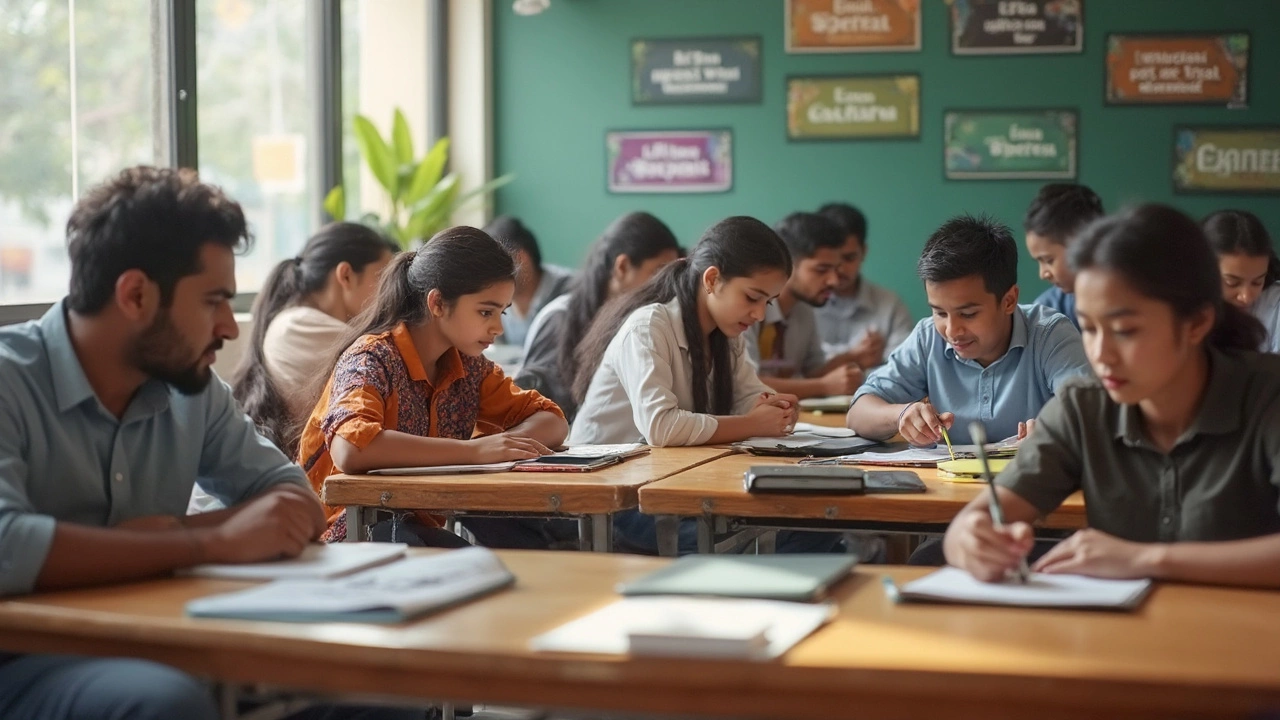In the realm of education and career advancement, competitive exams often stand as towering monoliths. They demand not just knowledge, but resilience, strategy, and an unwavering spirit. These exams have a reputation: they're tough, sometimes overwhelming, but always influential in shaping future pathways.
What's in a test that makes it notorious? It's not just about the questions, but also the depth of knowledge required, the sheer volume of material, and the pressure-cooker environment they create. And while some people breeze through with ease, others find themselves questioning both their capabilities and their nerves.
But why do people subject themselves to these trials? The answer lies in the rewards promised at the other end: dreams realized, doors opened, and ambitions fulfilled. So, as we explore the hardest exams out there, let's pause to look at how aspiring minds can tackle these challenges and what it means to truly prepare for the test of a lifetime.
- Understanding Competitive Exams
- Factors Making Exams Difficult
- The World's Toughest Exams
- Strategies for Success
- Embracing the Challenge
- Beyond the Exam Rooms
Understanding Competitive Exams
Competitive exams are a unique breed of assessments designed to push candidates to their absolute limits. They are not merely tests of basic knowledge or rote memorization, but rather complex evaluations of a person’s comprehensive understanding, logical reasoning, and sometimes even creativity. While regular exams primarily gauge the ability to recall information, competitive exams challenge candidates to apply what they know in novel ways. These exams play a crucial role in dividing the aspirants from achievers in various fields. For instance, securing a high score in the GRE might open doors to the world’s leading academic institutions, while cracking the bumpy terrain of the Indian UPSC Civil Services exam could set the stage for a career in administration and policy-making.
Despite their varying formats and scopes, competitive exams tend to share a few common characteristics. Firstly, they are highly selective, often accepting only a tiny fraction of applicants, which intensifies the competition. This narrow window necessitates not only academic excellence but also strategic preparation. Secondly, the exams are often cumulative, covering vast amounts of subject matter, which requires candidates to have a long-term study strategy. Lastly, they often involve time constraints which means that they test not only knowledge but also the ability to perform under pressure. This particular attribute is what makes these exams daunting as much as they are rewarding.
"Competitive exams are about sifting through thousands of hopefuls to find the candidates who can think on their feet and cope with the stress that inevitably comes with such high stakes," remarked an academic expert from EduCorp.
Preparation for these exams is no easy feat. Successful candidates often begin their preparation months, if not years, in advance. Many rely on time-tested strategies to maintain the endurance needed for long-term study. These include structured time management and forming study groups that foster peer learning. Access to quality materials and mentorship from those who’ve navigated the path before is seen as vital. The social and psychological support derived from family and peers cannot be understated in contexts where the journey is as much personal as it is academic. The digital age has introduced new tools into the preparation arsenal; online platforms offer dynamic resources, and virtual study groups form globally, diminishing the distances between aspirants.
Understanding what makes these exams tick is key. Historically, exams like the Chinese Imperial Examination served as a prototype for modern competitive tests, seeking to prove merit irrespective of social class by employing rigorous testing mechanisms. Fast forward to today, and the pattern remains. A nuanced understanding helps tailor preparation strategies, ensuring efforts are focused on achieving desired results. By embracing a positive mindset and emphasizing consistent effort, even the toughest exams can eventually turn into triumphs. After all, behind every exam’s façade of harshness, there lies a gateway to endless opportunities once conquered.
Factors Making Exams Difficult
When it comes to marking certain exams as the toughest nuts to crack, a blend of elements contributes to their notoriety. One prevailing factor is the extensive breadth of topics covered. These competitive exams stretch like an expansive roadmap that requires candidates to digest a wide array of subjects, each with its own depth of detail. Aspiring participants often find themselves buried in books, with weeks turning into months as they strive to master both the foundational concepts and the intricate details. This multifaceted nature demands not just retention of information but also a profound understanding, pushing candidates to explore beyond superficial knowledge.
Another critical aspect lies in the limited time frames provided to answer numerous, often complex questions. Imagine the heightened pressure when you're expected to distill months, sometimes years of preparation into a few defining hours. The clock ticks unrelentingly, creating an environment where candidates must race against time, juggling accuracy with speed. It's this unforgiving nature of timed exams that distinguishes mere scholars from agile thinkers capable of making quick, yet effective decisions under pressure. This challenge is compounded by unpredictable question patterns, designed to assess not only rote learning but adaptability and critical problem-solving skills.
These exams don't just test academic prowess; they delve into psychological endurance as well. The mental resilience required to persist through long study hours, the stress of the looming exam day, and often the uncertainty of the outcome all collect to form a difficult journey. The psychological toll is significant, sometimes leaving students questioning their abilities and future prospects. Balancing stress and maintaining confidence levels becomes just as crucial as the study material itself.
Moreover, competitive exams are often gateways to a limited number of coveted spots at prestigious institutions or lucrative positions. The stakes are high and the competition fierce, meaning one is not just vying against a knowledge test but against some of the brightest minds from around the globe. This rivalry adds a layer of external pressure, intensifying the difficulty. In some cases, acceptance rates are astonishingly low, reflecting the scant opportunities available relative to the number of applicants. It's this exclusivity and competition that adds another tier of complexity to these exams.
Interestingly, the cultural context can play a significant role too, as certain regions place a colossal emphasis on scholastic achievement through standardized tests. In countries like India, for instance, exams like the IIT-JEE are viewed not just as assessments but as societal yardsticks that measure potential. Such societal pressures often translate into generations of aspirants aiming to meet family expectations, embedding a deep-rooted imprint on the competitive exam landscape.
As Adam Grant once put it, "Competence means tackling the problem-solving strategies with agility and insight." This rings especially true for competitive exams, where creative thinking and agility often make a decisive difference.
Considerations like format and resources also play their part. Some of these exams necessitate paying exorbitant fees, access to study materials, and sometimes specialized coaching, all of which might not be within reach for everyone. Disparities in educational access and resources can set the stage for unequal opportunities, adding another stratum of challenge to those underprivileged. Therefore, individuals often need to navigate not only the test content but also the logistics and economics surrounding their preparation journey.

The World's Toughest Exams
The landscape of competitive exams is dotted with formidable challenges, each more daunting than the last. These exams are renowned globally for their difficulty, often acting as gatekeepers to exceptional opportunities and careers. One such legendary test is the Union Public Service Commission (UPSC) exam in India, which is notorious for its rigorous selection process. The UPSC exam fills some of the most prestigious civil service positions in the country, and every year, millions apply to compete for merely hundreds of positions. The exam spans a range of subjects including history, science, and politics, demanding comprehensive understanding and exceptional analytical skills.
Similarly, the gaokao in China is another trailblazer in terms of difficulty and pressure. This test is a life-defining moment for many Chinese students, determining their path to higher education. The exam is intense, covering everything from mathematics to literature, and lasts for approximately nine intense hours spread over two or three days. There's a saying in China that the gao could make or break a future, underscoring the immense societal pressure associated with it. Anecdotal evidence often suggests that the test is so grueling that there's a market for stress-relief products specifically tailored for students preparing for this exam.
The Challenge of Professional Exams
Beyond academia, some exams pave the way to prestigious professions, such as the All Souls Prize Fellowship Exam at the University of Oxford. Known for its extremely low pass rate, this exam tests candidates' abilities in fields like philosophy, politics, and classics. It is infamous not for its syllabus, but for its open-ended approach. Candidates must navigate essays that challenge their intellectual dexterity and creativity. Just qualifying for this exam is considered an achievement in itself.
In the United States, the CFA exam is known as one of the toughest finance industry assessments. Offered by the CFA Institute, its pass rate is famously low, often below 50%, even for well-prepared candidates. The rigorous syllabus encompasses several fields like ethics, quantitative methods, and financial statement analysis; it demands not only a wealth of knowledge but also excellent application skills. Each level increases the challenge, necessitating thousands of hours of self-driven study over multiple years. According to a report by the CFA Institute, only about 10% of candidates manage to pass all three levels of the exam on their first attempt, underscoring how demanding and competitive the process is.
"The CFA exam is undoubtedly tough, but for those in the finance sector, it’s often seen as an essential stepping stone toward achieving career milestones." - Financial Times
With such exams, success is not just about knowledge. Emotional endurance, time management, and strategic thinking play critical roles. In the words of many who have faced these trials, preparation is both an intellectual and psychological journey. As aspiring professionals and students gear up for these examinations, it becomes a testament to their resilience, ingenuity, and ambition to push the limits of personal accomplishment. These are not merely exams; they are transformative experiences shaping future leaders and thinkers around the world.
Strategies for Success
When preparing for the world's hardest competitive exams, it's crucial to adopt a strategy that not only covers the breadth of the syllabus but also strengthens your mental resilience. Effective preparation begins with understanding the structure and specific demands of the exam you are tackling. Identify the key areas where your grasp might be weaker and allocate extra time to those subjects—early diagnostics can save time and elevate scores significantly. Many successful candidates recommend starting with a detailed study plan that breaks down the entire syllabus into manageable chunks. This phased approach allows for systematic learning and helps prevent overwhelm as the exam date approaches.
One of the core strategies is regular practice and mock testing, which offers insight into your preparation level, time management skills, and exam temperament. Simulating the exam environment with timed practice tests ensures you are comfortable with the time constraints and the pressure involved. It’s an enormously beneficial exercise and is a common denominator in the success stories of top performers in the field. Equally important is reviewing your performance critically to identify patterns of errors or topics that require further revision. There's no successful exam strategy without consistent self-evaluation and adjustment.
Achieving success in the hardest exams isn't solely about academic proficiency but also managing the mental and emotional aspects of preparation. Prioritize wellness and include short breaks, relaxation techniques, and physical exercise in your study schedule to maintain peak mental and physical health. The mind tends to absorb information more effectively when paired with adequate rest and a balanced lifestyle. A well-known strategy emphasized by experts like Angela Duckworth, a psychology professor at the University of Pennsylvania, centers around the concept of ‘grit’ – perseverance and passion for long-term goals.
"Grit is living life like it’s a marathon, not a sprint," Duckworth advises, highlighting that patience and persistent effort are key drivers in the journey to successful achievement.
Utilizing available resources intelligently can also be a game changer. This means tapping into online courses, study groups, academic books, and even social media communities dedicated to the specific exam. Collaborative learning often brings in new perspectives and keeps motivation levels high. Some candidates might benefit from hiring a mentor or coach with firsthand experience of the exam to guide their preparation, mirror real-life scenarios, and offer personalized insights. Don't shy away from reaching out to a network of former candidates or professionals who have cleared the exams you are preparing for. Their experiences can offer practical tips and motivation when the going gets tough.

Embracing the Challenge
In the pursuit of passing the world's toughest competitive exams, there lies a journey that is both daunting and invigorating. As aspirants prepare to embark on this rigorous path, the initial step is to recognize the magnitude of the challenge ahead. Embracing such an endeavor requires not only intellectual preparation but also an inner fortitude to withstand the pressures commonly associated with these hardest exams. The tests are designed to filter out the best of the best, ensuring that only those truly equipped are granted passage to the next stage of their professional or academic careers.
Accepting the challenge is about mindset. It's about reframing perceived obstacles as opportunities for growth. James Parker, an educational strategist, once said,
"Every setback in preparation is a set-up for a comeback stronger than ever."Students must learn to view setbacks as a natural part of the learning process. They need to stay motivated to continue moving forward, and it requires adopting a mindset that encourages growth from failure rather than a fear of it. This mindset shift can be pivotal for success.
Another critical aspect of embracing this arduous journey is the development and adherence to a structured study plan. Candidates must craft a personalized roadmap that identifies key topics and allocates adequate time for each one. This is not just about memorizing concepts but diving deep into understanding them. Having short breaks interspersed within intense study sessions helps maintain focus and prevent burnout. Staff at the University of Toronto have noted that strategic resting improves both retention and recall, crucial components of thriving in exam preparation.
For many, the pursuit goes beyond academics and career dreams. It's a test of character, resilience, and fortitude. The camaraderie found in study groups and online forums often provides both support and motivation. Engaging with peers provides an environment where ideas are exchanged, questions rigorously debated, and knowledge collectively built. Many find comfort in knowing that they are not alone in the struggle.
It’s essential to remember that self-care is part of embracing the challenge. Maintaining physical health through regular exercise, balanced nutrition, and adequate sleep plays a significant role in cognitive performance. Aspiring achievers should integrate these elements into their daily routines to support their mental agility. Meanwhile, harnessing techniques such as meditation and mindfulness can offer psychological solace amidst the chaos of preparation.
Ultimately, this journey, though challenging, can be extremely rewarding. The learning acquired, the skills honed, and the networks built during this period often have benefits that extend far beyond the exam results themselves. Each individual’s story is unique, carved with persistence and marked by courage. Those who dare to embrace these formidable barriers can often look back with pride, recognizing their personal growth and the doors they have pushed open.
Beyond the Exam Rooms
The echoes of a competitive exam stretch far beyond the confines of the test center. For many, these exams are not just a test of intellect, but a profound challenge that dictates their emotional fortitude, time management, and even interpersonal dynamics. Preparing for one of the world's toughest exams often involves months—if not years—of dedicated study, sleepless nights, and sacrifices in daily life. Candidates are required to dive deeply into subjects, acquiring a breadth of knowledge that often transforms their worldview. This process not only equips them with requisite information but also instills discipline and a relentless pursuit for knowledge.
While the quest for success can be isolating, it also cultivates a unique camaraderie among candidates. Study groups spring into life, creating communities bound by common goals and shared stress. Within these groups, aspirants exchange tips, provide emotional support, and often form lifelong friendships, illustrating how exams act as social equalizers by bringing together diverse individuals united by ambition. Beyond academics, the importance of mental well-being emerges prominently. It’s vital to acknowledge the stress these competitive exams might induce, which is why many institutions now integrate mental health resources into their preparatory programs.
The World Health Organization stresses the importance of balancing mental health with educational pursuits, emphasizing that "mental well-being is foundational to effective learning and long-term success."Recognizing this, aspirants are encouraged to engage in hobbies, exercise regularly, and indulge in activities that offer joy and respite from the monotony of studies. In essence, the journey transcending brilliant scores to a well-rounded personality is invaluable, advocating a balanced lifestyle even amidst the chaos of exam preparations.
Moreover, competitive exams bolster the development of critical skills pertinent to professional and personal growth. Candidates constantly hone their problem-solving abilities, analytical thinking, and decision-making capabilities. When faced with multifaceted questions, they learn to approach issues from different angles, akin to scenarios encountered in real-life occupations. Building these skills is not just about excellence in the exam room, but also about crafting a solid foundation for careers in diverse fields, from engineering and medicine to law and business. Beyond that, societies place substantial emphasis on these exams for reasons beyond individual gain. They act as filters, systematically identifying the most talented individuals who carry the potential to contribute to their respective fields substantially.
With the relentless pace of globalization, such exams facilitate the recognition of qualifications across borders, allowing a global mobility that empowers individuals to thrive anywhere. Interestingly, statistical data provides fascinating insights into the reach and impact of these exams. Here's a glimpse into some representative figures:
| Exam | Annual Participants | Success Rate |
|---|---|---|
| UPSC Civil Services, India | 1,000,000+ | 0.2% |
| Gaokao, China | 10,000,000+ | 3% |
These statistics underscore the immense competition and the significant achievement that acing these exams represents. So, as candidates emerge from the exam rooms—their minds exhausted but filled with potential—it’s clear that these exams shape not just careers, but lives, attitudes, and perspectives, in ways both profound and lasting. They are not merely tests but pivotal chapters in the expansive book of life.



